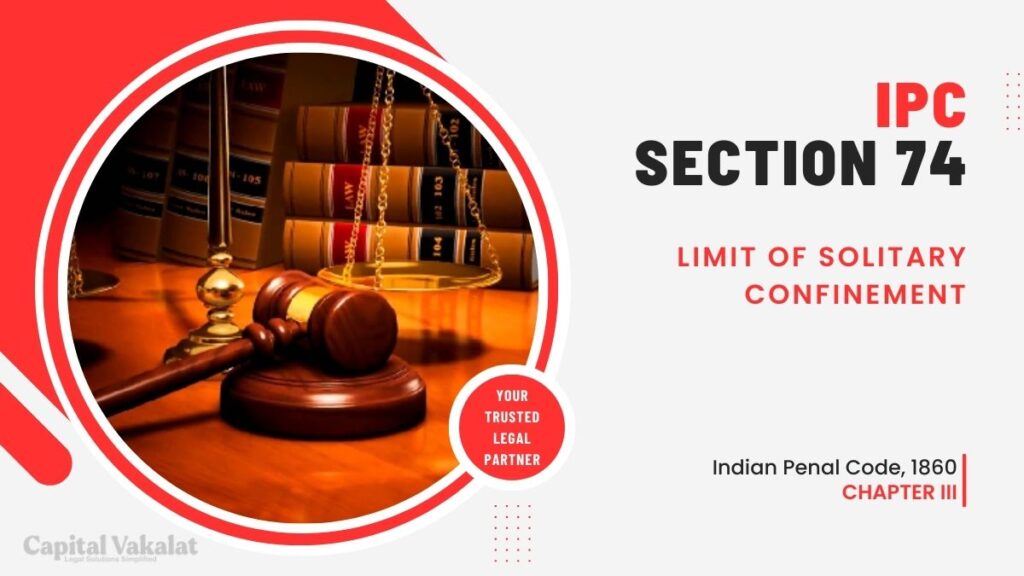In the realm of legal provisions and statutes, Section 74 of the Indian Penal Code (IPC) holds significant importance, particularly when it comes to the administration of justice and the rights of individuals.

This article delves deep into the intricacies of Section 74 IPC, shedding light on the limit of solitary confinement it imposes and the implications it has on the penal system in India.
Understanding Section 74 IPC
Section 74 of the IPC deals specifically with the “limit of solitary confinement.” It lays down the rules and regulations governing the use of solitary confinement as a form of punishment in the Indian criminal justice system. Solitary confinement refers to the isolation of a prisoner in a cell or a separate area, away from other inmates, for a specified period as a disciplinary measure.
The Purpose of Solitary Confinement
The primary objective of solitary confinement, as per Section 74 IPC, is to isolate and segregate a prisoner who poses a threat to the safety and security of other inmates or prison staff. It is considered a last resort and is imposed only when all other forms of punishment or control have failed.
Duration of Solitary Confinement
Section 74 IPC explicitly states that solitary confinement shall not exceed fourteen days at a stretch. This provision is essential as it sets a clear limit on the duration of isolation, ensuring that it does not transform into a form of cruel and inhuman punishment.
Judicial Scrutiny
The legal framework in India is designed to safeguard the rights and dignity of individuals, even those within the penal system. Section 74 IPC is subject to rigorous judicial scrutiny. Any instance of solitary confinement beyond the prescribed limit can be challenged in a court of law, and the authorities responsible can face legal consequences.
The Rationale Behind Section 74 IPC
The inclusion of Section 74 in the IPC is rooted in principles of human rights and the need to prevent the abuse of power by prison authorities. It recognizes that prolonged solitary confinement can have severe psychological and physical effects on an individual, which is why it imposes a strict time limit.
Challenges Faced in Implementing Section 74 IPC
While Section 74 IPC is a significant step towards protecting the rights of prisoners, its implementation faces various challenges:
Overcrowding
One of the primary challenges is the issue of overcrowding in Indian prisons. Overcrowded prisons make it difficult to isolate a prisoner effectively, leading to potential violations of Section 74.
Lack of Infrastructure
Many Indian prisons lack the infrastructure required to ensure that solitary confinement adheres to the prescribed standards. Inadequate facilities can lead to prolonged confinement beyond the specified limit.
Awareness and Training
Proper awareness and training of prison staff regarding Section 74 IPC are essential. Without adequate knowledge, the authorities may inadvertently violate the provision.
Conclusion
Section 74 IPC serves as a crucial safeguard in the Indian criminal justice system, preventing the excessive use of solitary confinement and protecting the rights of prisoners. However, its effective implementation relies on addressing the challenges it faces, such as overcrowding and the lack of infrastructure.
FAQs
Can the duration of solitary confinement exceed fourteen days?
No, as per Section 74 IPC, solitary confinement should not exceed fourteen consecutive days.
What happens if the authorities violate Section 74 IPC?
Any violation of Section 74 can be legally challenged, and those responsible may face legal consequences.
Why is the proper implementation of Section 74 IPC crucial?
Proper implementation is vital to protect the rights and well-being of prisoners and prevent abuse of power by prison authorities.
Are there international guidelines on solitary confinement?
Yes, various international human rights organizations provide guidelines on the use of solitary confinement, emphasizing its limited and humane use.